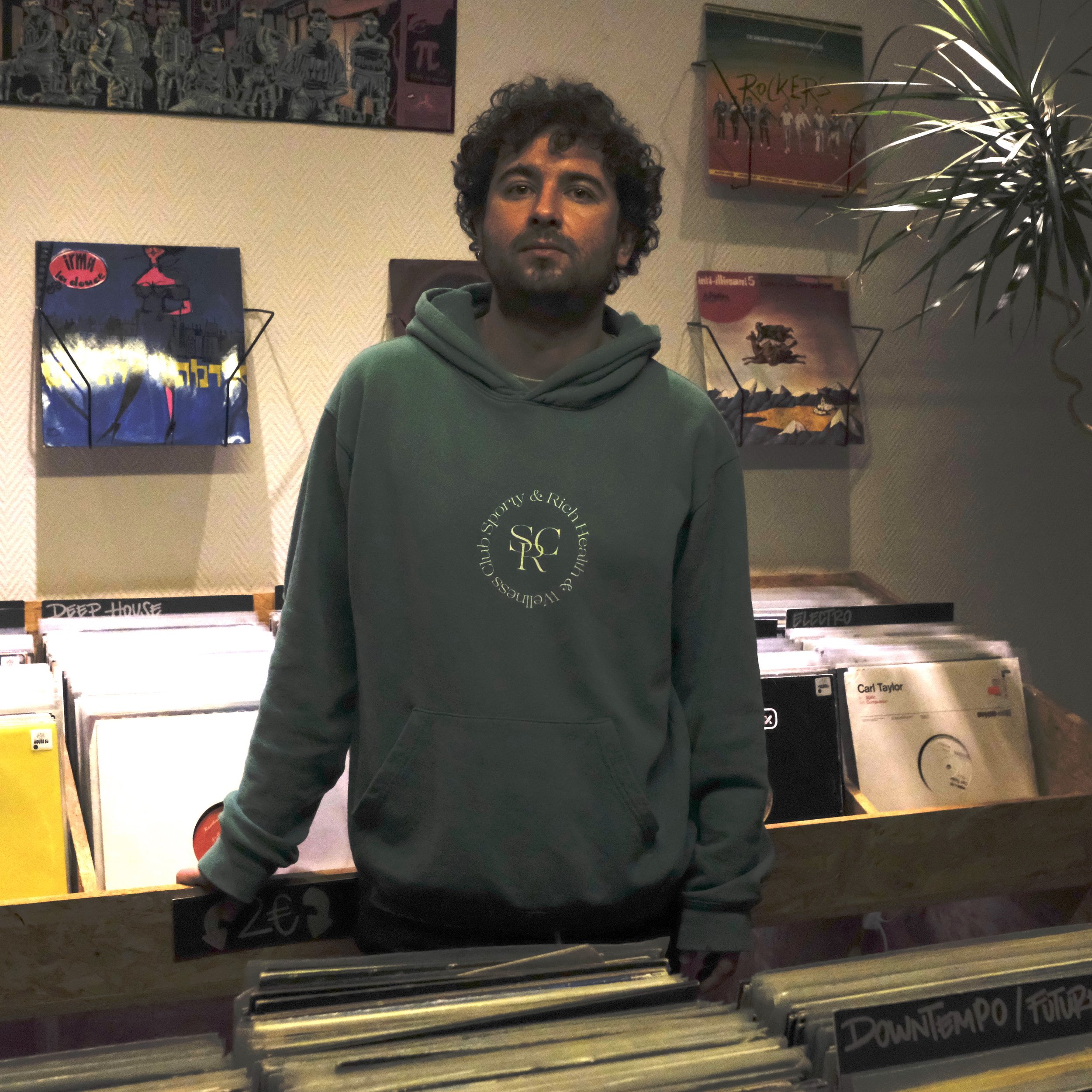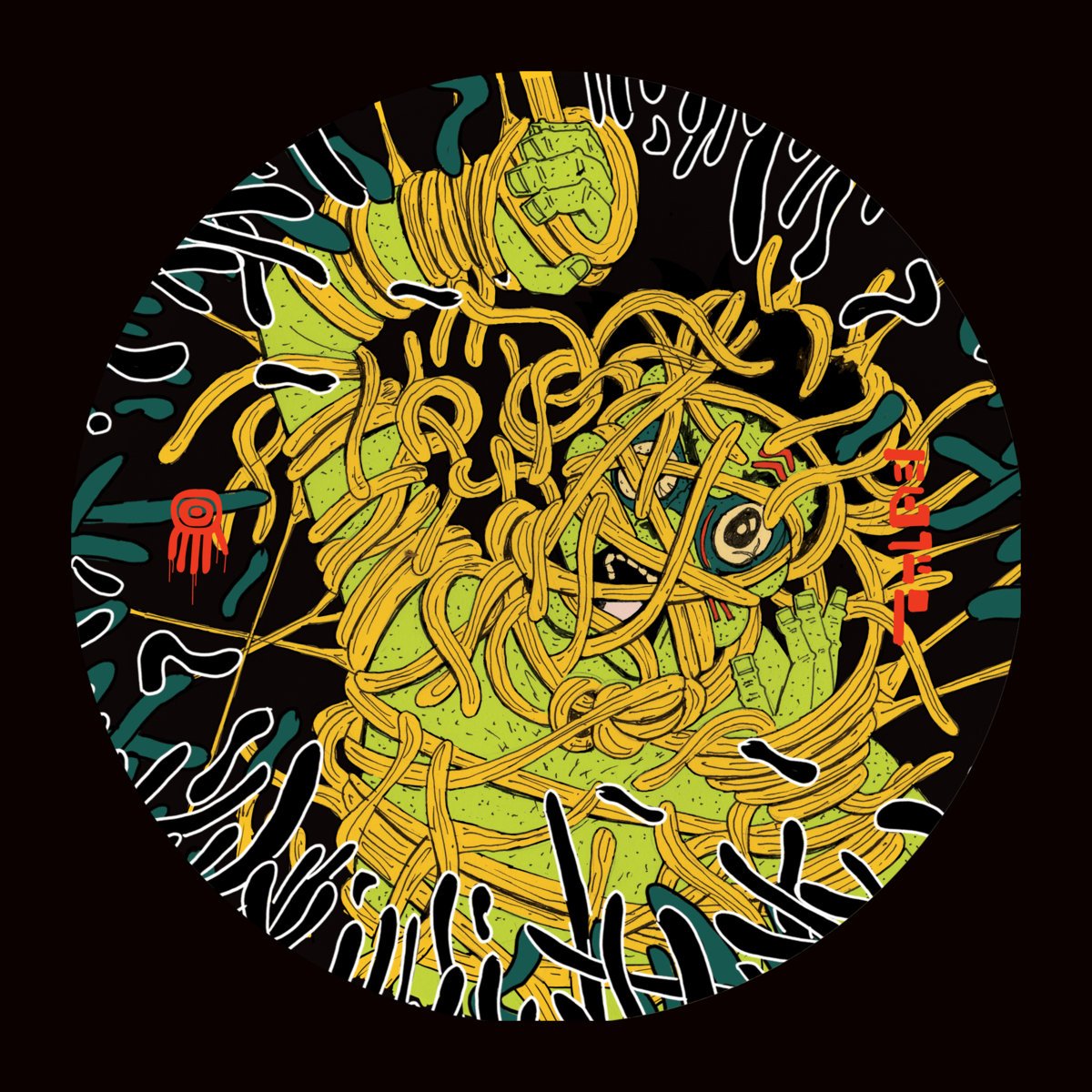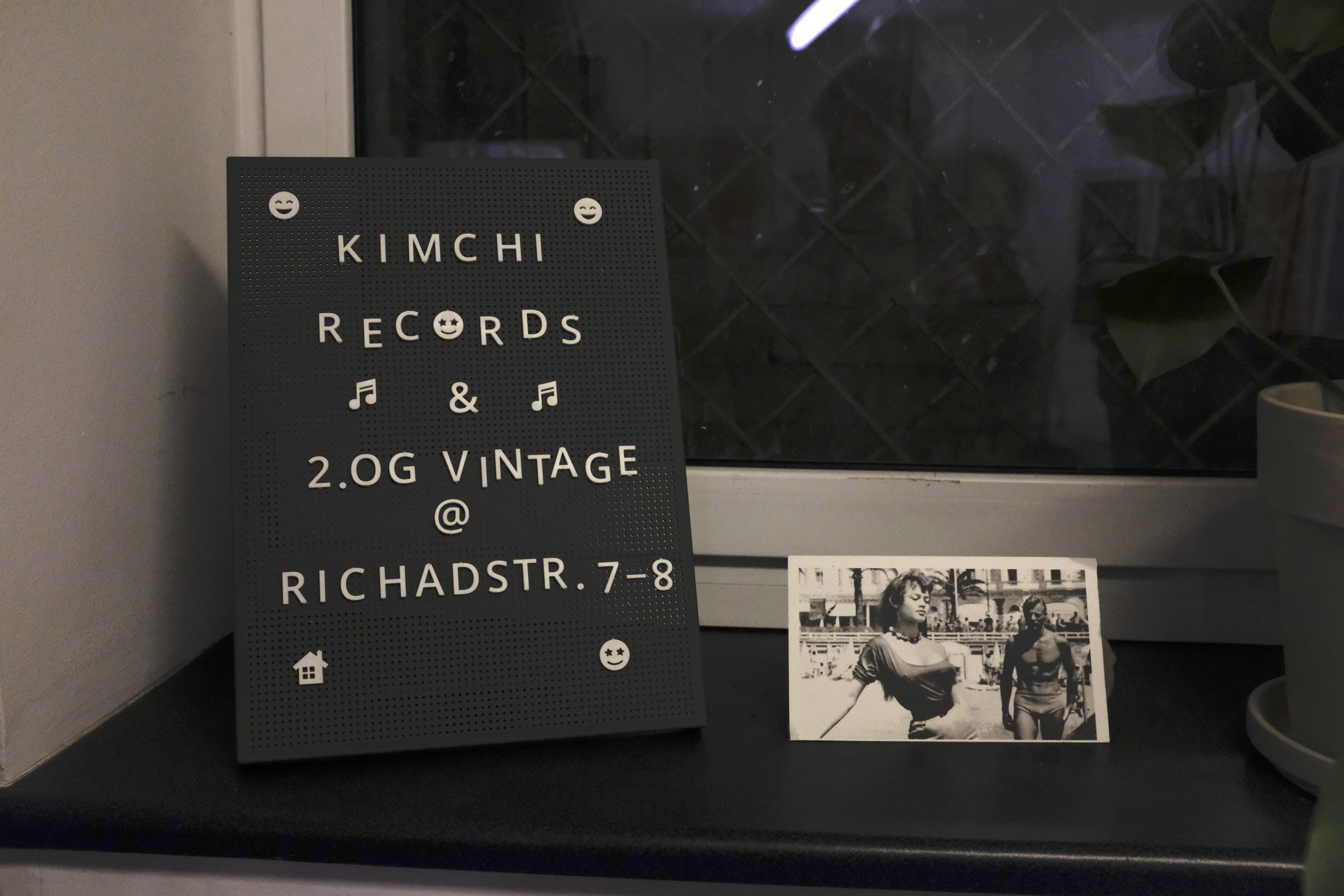A Visit And Chat With Kimchi Records' Patamamba
We visit the Neukölln store of Kimchi Records and speak with one of its owners Patamamba, ahead of his ‘AEORI’ EP release
Patamamba @ Kimchi Record Store, Berlin
If you lived or visited Berlin (but probably also if you haven’t), you must have heard of the Neukölln neighbourhood. This is the ultimate spot for some contrasts that shine throughout the city - long-time Berliners are likely to remember when this used to be a dangerous area, but things have changed radically in a couple of decades. Traditionally highly populated by immigrants of Turkish and Arabic descent, and more recently joined by the latest waves of young East and South Europeans looking to shake up their lives in Berlin, the neighbourhood is a true melting pot in all senses.
Keeping its international vibe as well as its underground cultural offer alive, a new record store opened here shortly before the pandemic in 2019… This is Kimchi, which also has a location in Quito, Ecuador (it’s run by two Ecuadorians) and operates as a record label as well. Located very close to the Karl-Marx-Allee U-Bahn, this location struck me as an extremely warm spot: not only the people who worked there but also almost every visitor seems to be friends with each other - between peeking from one record stash to the other, you’re very likely to get caught in a crazy conversation about record shippings gone wrong or some unbelievable DJ tour stories. The used records selection is top class, mostly coming from local underground DJs, and the store interiors present a peculiar 70s style, from its kitsch wallpapers to the shiny disco ball hanging from the ceiling like the worst iconic disco movies.
Into the new year, the Kimchi label is offering its third release to the public, by non-other than its owner Patamamba. We took on the occasion to go and visit the store, take some pictures and ask about a few different topics… Enjoy the read and make sure to pay a visit to this special place if you are around!
Hey guys! First off I want to say I really like what you are doing at Kimchi and it’s a pleasure to have you here. I’d like to start off with a few questions regarding your next release by one of your owners Patamamba, and then move forward to some questions that are more related to your shop and the vinyl realm.
The release starts off with some atmospheric and suspended broken beats, moves through some fresh electro, neat underground house grooves and even throws some inventive jungle-inspired patterns in the last track. Where did you get the music inspiration for these tracks? Were they composed all recently or is it something that came together through time?
First of all I want to thank you guys for the interview. The inspiration and conceptualisation of the release has a direct correlation with my work at the shop (Kimchi records). We are always in search of different collections not only Electronic but different genres and when filtering through I found amazing new sounds and samples which had a direct influence on the tracks. Most of the tracks were produced recently, except A1 and B3. I already had them in my harddrive for some time, I just did a re-edit and adapted them to fit in with the sound I was looking for.
Also in terms of inspiration, we’d like to ask how this EP relates to your personal story and upbringing? (if they do)
Being raised in Ecuador gave me the opportunity to listen, learn and record different kinds of instruments, like many types of percussion, flutes and voices from around the country. I often use many of these recordings in my songs, I think they always bring some extra texture to the music I make. Ecuador is a country that has many different cultural backgrounds because of its history, and that influence of rich sounds, colours and smells has had a huge impact on the way I approach my music and overall lifestyle.
‘AEORI’ EP cover
I feel like this is the kind of electronic music that can work well on the dancefloor if placed at the right time during a set, but that also has a focus on ambience which makes it very enjoyable outside of club spaces. Do you often focus on the effect a track will have on the dancefloor when composing? In general, how do you usually approach your studio time?
I think it is important to point out that when we decided to start our own label, Chicaiza and I visualised the concept of the releases not only as a dancefloor oriented label but more of an in between sound where the artists have the liberty to do both dancefloor or more listening oriented tunes, kinda like mini LPs. I am glad to see that message got through in my release. In a more personal reflection I realize that when I'm focusing on a song that has more of a dancefloor vibe I dont think a lot in the frequencies or the way of composing, I like to feel free and let it happen organically, most of the time i'm just making music without any attachments. I do love making rhythmic and percussive beats mixed with drum machines and synths. When starting a track I usually start with something organic, a recording or a sample that I have been obsessed with and expand from there. I do see my time in the studio as constant practice as I'm always learning new things, finding new machines or ways to compose, and having new interests. That's why I make it a ritual to sit in my studio everyday, as I feel only with practice magic can happen.
“With the label we visualised the concept of the releases not only as a dancefloor-oriented label but more of an in between sound, where the artists have the liberty to do both dancefloor or more listening-oriented tunes”
Can you tell us a bit more about the Patamamba project? Where’s the name from? Musically, what’s its story?
It is funny you ask, the name actually was the nickname of my father, and my father had a big connection with the Trance/Techno scene in Denmark. Thanks to my fathers influence I got to listen to music that changed my life. I remember he gave me CDs from different genres, Goa, trance, ambient, world recordings and sometimes techno and house to name a few, and when releasing my first EP and looking for a name I thought it was a good way to pay respect to him and the influence he had on my music. A big part of my sound comes from hours and hours of going through music, digging and finding the tunes that inspire me. As I mentioned before from the influence of my childhood in Ecuador and its sounds, to my fathers musical impact, and finally opening Bikini waxx and Kimchi records, a wide range of music has opened up for me, making me realize that if you look far enough you can find good music in every genre and style out there.
Test pressing of KIMCHI 003
The Kimchi record shop in Neukölln (Berlin) opened just a few years ago, but you have been around the Berlin underground/vinyl environments for a while now. How did you see the city’s scene change, before but also during covid? And what do you like about this city to this day?
I think Berlin is a city that is always changing, as well as the vinyl environment and community. During Covid it was harder for the shop, but it was hard for everyone. I saw during the last years many new producers and labels coming out, so in a way a lot of new music has been produced. Well I love the liberty that Berlin offers, as a creator as a human, it is always challenging me to open my scope and that is something I would not trade for anything.
“The backbone of our shop is the fact that it has been community oriented from day one”
What were the biggest challenges you faced with the record store?
Well, at the beginning finding a location was a big challenge. We all know the situation of renting in Berlin at the time being, real estate is a mess. But after a year of looking we were lucky enough to find the location at Richardstraße. The idea of the shop was to make it more intimate, somehow homey, which is truly the vibe you feel when you come to the store. Once we opened the shop we had only the last weeks of summer to share our world, and then a couple of months later the pandemic began. So having to go through our first two years without a lot of tourism meant our market was cut in half which was definitely a challenge. But I am super grateful for what we have accomplished in the last two years.
It was great to visit your nice record shop, definitely one of the most welcoming vinyl shops I ever visited. What do you think are the most important features a record shop should have? What makes it special?
I believe the backbone of our shop is the fact that it has been community oriented from day one. We received help from our partners and close friends before the shop was even open, once we worked on the design and concept we did it all with the help of our friends, and I think that already gave the shop an energy from the start. Shortly after opening, Kamyar and Marius joined the shop, which we are super grateful for. Music is all about sharing, and in Kimchi we like to make sure you feel not only as a customer but a guest, comfortable and at home. I can not say that there is a most important feature for a shop, as each shop has its own thing that makes it special.
“Music is all about sharing, and in Kimchi we like to make sure you feel not only as a customer but a guest, comfortable and at home”
Patamamba together with Kamyar Keramati, who also works at Kimchi
We recently entered 2022 and are going deep into this new 20s decade. How do you expect the vinyl consumption and use to change in the years to come?
Well, if I have learned something this year is to expect nothing and just try to live life on a daily basis, but If we focus on the numbers, then vinyl sales should increase. Now, pop artists are starting to press a big amount of copies, so the industry of printing is getting clogged, affecting mostly small and underground labels, I think that says a lot.
You previously told me about your Quito (Ecuador) branch - how does it differ having a record shop there compared to Berlin? Is the music you select for the two stores different?
The two shops are similar in concept but the markets work completely differently. In Ecuador people are more interested in the latest releases and new music, not so much in old releases. I think that is because there has not been too much availability, but I think that will change with time. At the same time for us it is very interesting to see the influence that the shop is having in the sound of the city as well as in the approach that the new generation of DJs have. We are excited to see what's to come.
Thank you so much for this interview and all the best for the record and your other activities with Kimchi!
I want to send a warm hug to all and anyone that supports my music, the shop and all that surrounds the world of KIMCHI.





